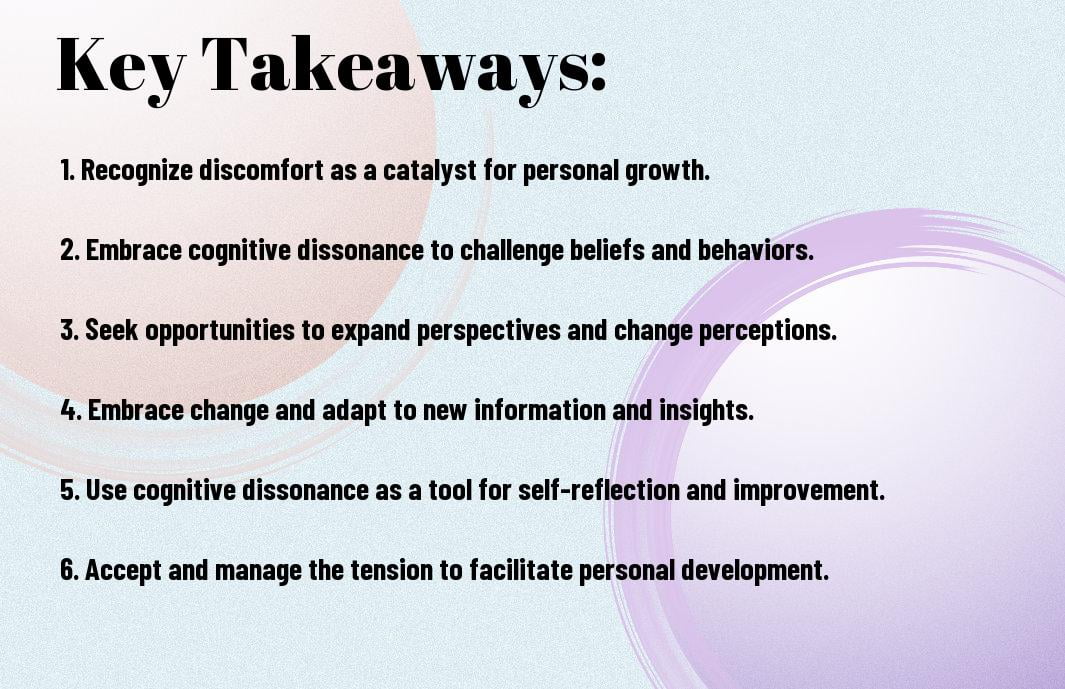It’s crucial to explore into cognitive dissonance and its profound effect on personal growth. Cognitive dissonance occurs when our beliefs and actions are not aligned, causing inner turmoil. This psychological phenomenon can hinder progress or motivate transformative change. Understanding how cognitive dissonance influences our mindset and behaviors is important for fostering positive growth and self-improvement. Let’s explore how embracing cognitive dissonance can lead to significant personal development.
Key Takeaways:
- Cognitive dissonance can hinder personal growth: When individuals are faced with conflicting beliefs or ideas, they experience cognitive dissonance, which can lead to discomfort and resistance to change.
- Acknowledging cognitive dissonance is the first step to personal growth: By recognizing when cognitive dissonance is present in our thoughts and behaviors, we can begin to address the underlying conflicts and work towards resolving them.
- Embracing cognitive dissonance can lead to transformative growth: Rather than avoiding or denying cognitive dissonance, embracing the discomfort and using it as a catalyst for personal growth can lead to profound self-discovery and positive change.

Understanding Cognitive Dissonance
Definition and Origin
Definition – Cognitive dissonance is a psychological phenomenon that occurs when a person experiences a state of tension or discomfort due to holding two conflicting beliefs, attitudes, or behaviors simultaneously. Originating from social psychologist Leon Festinger’s theory in the 1950s, it highlights the discomfort individuals feel when faced with inconsistency.
Mechanisms and Manifestations
Dissonance – Cognitive dissonance is resolved in various ways, including changing beliefs or behaviors to align with the conflicting information, seeking out new information that supports existing beliefs, or dismissing the conflicting information altogether. This internal tension can lead to justification of contradictory actions or reinforcing existing beliefs.
Another important aspect of cognitive dissonance is its role in personal growth. When individuals confront conflicting beliefs, they have an opportunity to reflect on their values and choices, leading to positive growth and development. However, if not addressed, cognitive dissonance can lead to dangerous rationalizations and reinforce harmful behaviors.
Cognitive Dissonance and Its Role in Personal Growth
Assuming Cognitive Dissonance and its Impact on Our Lives has a significant role in personal growth. It refers to the discomfort caused by holding conflicting beliefs or attitudes simultaneously. This psychological phenomenon challenges individuals to resolve this conflict and seek harmony within themselves.
Challenges to Self-Identity
For individuals, facing cognitive dissonance can be unsettling as it questions their core beliefs and values. It challenges their self-identity and requires them to confront inconsistencies within themselves. This discomfort can either motivate personal growth or lead to avoidance and denial.
Opportunities for Personal Development
To embrace cognitive dissonance is to welcome growth and self-discovery. When faced with conflicting beliefs, individuals are presented with an opportunity to reevaluate their perspectives, learn from new information, and adapt their mindset. This process fosters personal development and strengthens critical thinking skills.
Growth: Embracing cognitive dissonance can lead to profound personal growth, as individuals confront their inner conflicts and strive for coherence. By challenging their beliefs and attitudes, they open themselves up to new perspectives and experiences, ultimately evolving into more resilient and self-aware individuals.
Strategies for Managing Cognitive Dissonance
Awareness and Acknowledgment
With cognitive dissonance, the first step towards resolution is recognition. Being aware of the conflicting beliefs or behaviors is crucial in addressing the discomfort it brings. By acknowledging the presence of cognitive dissonance, individuals can begin to explore the underlying reasons behind it and work towards resolving the inner conflict.
Methods of Resolution
The process of resolving cognitive dissonance involves making a decision to either change beliefs or behaviors to align with each other or finding new information that can reconcile the discrepancy. One effective method is to seek out additional information or perspectives that can help in understanding the situation better and reducing the mental tension.
This active approach to resolving cognitive dissonance allows for personal growth and development, as individuals confront conflicting beliefs and work towards achieving a more harmonious mindset. By actively seeking resolution, individuals can overcome the discomfort and inner turmoil that cognitive dissonance brings, ultimately leading to a more authentic and fulfilling life.

To wrap up
Taking this into account, it is crucial to acknowledge the impact of cognitive dissonance on personal growth. By recognizing when our beliefs and actions are in conflict, we open the door to potential growth and development. Embracing and working through this discomfort can lead to a deeper understanding of ourselves and our motivations, ultimately paving the way for personal transformation and progress.
FAQ
Q: What is cognitive dissonance?
A: Cognitive dissonance is the mental discomfort or tension that occurs when a person holds two or more contradictory beliefs, values, or attitudes simultaneously.
Q: How does cognitive dissonance impact personal growth?
A: Cognitive dissonance can hinder personal growth by creating inner conflict that prevents individuals from taking actions aligned with their goals or values. Resolving cognitive dissonance through self-reflection and behavior change is crucial for personal development.
Q: How can one address cognitive dissonance to facilitate personal growth?
A: To address cognitive dissonance for personal growth, individuals can practice mindfulness, engage in self-exploration, challenge irrational beliefs, seek new information, and make conscious efforts to align their thoughts, beliefs, and behaviors.




